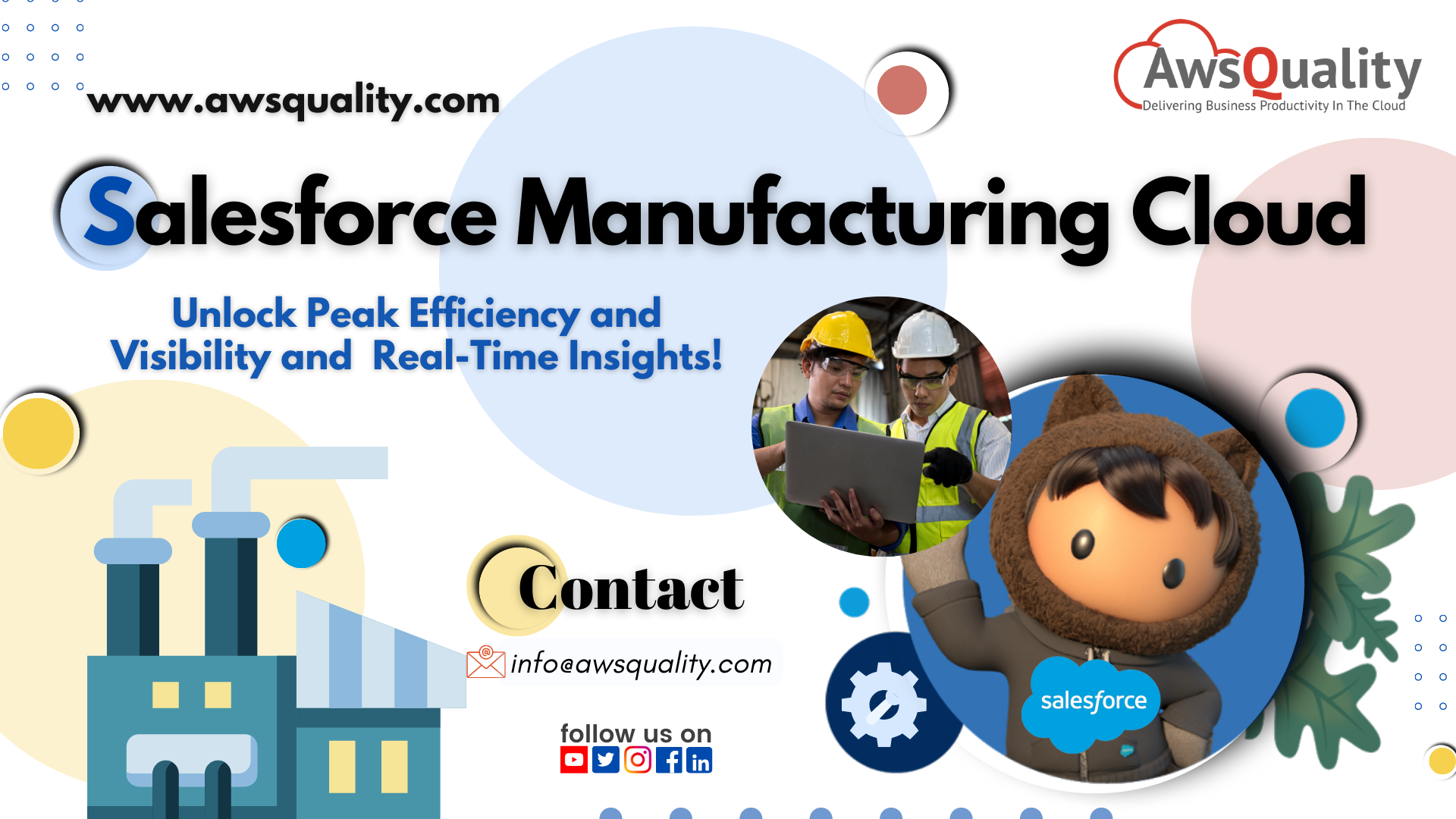
Find out how AI and top Salesforce Service Cloud partners can enhance your efficiency and security. Dive in with AwsQuality to see the difference.
Salesforce Manufacturing Cloud uses artificial intelligence (AI) to optimize processes, forecast problems, and increase efficiency in the manufacturing sector. Manufacturers can benefit from improved collaboration, simpler procedures, and real-time visibility by integrating with Salesforce Service Cloud Implementation Partners. This integrated strategy uses AI-driven technologies to protect data security while simultaneously enhancing program management and sales forecasting. Manufacturers may maintain their competitiveness and innovation by utilizing Marketing Cloud Appexchange solutions and top Salesforce consultants to further boost their skills. You may adapt to the manufacturing of the future and change your company using Salesforce Manufacturing Cloud to increase output and please clients.
How can Salesforce Manufacturing Cloud boost your efficiency and visibility?
Let’s examine how the Salesforce Manufacturing Cloud may increase manufacturing efficiency and dispel its mystery. 🚀
1. Whole View of Possibilities and Consents:
- Manufacturing Cloud for Sales gives you a complete view of net new opportunities in addition to client sales agreements, long-term projects, and demand projections.
- Manage every aspect of your company’s book with a single platform.
- Use sales agreements to increase account transparency and monitor the performance of the agreements over time.
2. Unified Sales Forecast:
- Compile an all-inclusive estimate that projects volumes and income streams for both new and existing businesses.
- Present insights from the account team and create complex forecasting computations.
- Integrate with enterprise planning systems for better alignment. 3. Program-Based Business Management:
- Plan and carry out production programs in a way that maximizes sales.
- Calculate the total market share that each manufacturer and program will have.
- Work together with clients to handle third-party demand streams and improve program projections. 4. Efficient Visit Management:
- Arrange field representative visits using action plan templates, which include the visit’s location, priority, and anticipated duration.
- Monitor important KPIs for every assignment and raise account team productivity. 5. Integration of Related Products:
- Utilize Data Cloud, MuleSoft Anypoint Platform, Einstein AI, and Rebate Management to expand Manufacturing Cloud’s capabilities.
The Salesforce Manufacturing Cloud fosters more cooperation, streamlines processes, and offers manufacturers instantaneous visibility. Please inquire if you would like more in-depth case studies or blog posts about Salesforce! 🔗
Elaborate on AI’s function in the Manufacturing Cloud.
Salesforce Manufacturing Cloud uses artificial intelligence (AI) to revolutionize the manufacturing sector and increase productivity. This is the situation where AI is useful:
- Events Produced by Machines Monitoring: The secret is to maintain predictability. Gen AI analyzes telemetry data from machinery and equipment to spot any problems before they arise.
It enables maintenance teams to proactively address issues by offering recommendations for fixes and service schedules.
- Customer Service Automation: Expectations for post-purchase support are growing. Manufacturers can react instantly with the aid of Gen AI.
It makes individualized service possible, increasing client happiness and loyalty.
- Supply Chain Optimization and Demand Forecasting: AI takes into account both internal and external data (market movements, world crises) to provide precise demand forecasting.
Supply chain shocks can be prevented and knowledge-based, predictive maintenance can be implemented.
- Data-Driven Insights and Decision-Making: Artificial Intelligence analyzes enormous volumes of data to enhance output, minimize downtime, and optimize manufacturing lines.
It reduces costs and raises end-user satisfaction.
In conclusion, Manufacturing Cloud’s AI enables firms to innovate, simplify processes, and maintain their competitiveness. 🚀🔗
How can manufacturers use AI to guarantee data security?
Manufacturers need to consider cybersecurity concerns while integrating industrial AI in order to safeguard sensitive data. The following are some crucial actions:
- Limit External Network Connections: Cloud-hosted AI models are frequently accessed by manufacturers. These external links may provide openings for online attacks.
MFA, or multi-factor authentication, is a useful security measure to lower the dangers connected to remote access.
- Minimize Solution Diversity: Keep the variety of remote access products, vendors, and solutions in your environment to a minimum.
Steer clear of perpetually open remote connections; instead, make them available upon request and keep an eye on how they are used. - Quickly Cut Off External Connections: For efficient incident response, make sure you can quickly cut off external connections.
- Anonymize Sensitive Data: A significant quantity of sensitive data is produced by manufacturing facilities. Before transferring this data to commercial AI systems, make it anonymous.
Unauthorized access is mitigated in part by MFA and the aforementioned suggestions.
Recall that while utilizing AI in manufacturing boosts productivity, proactive security measures are necessary to protect sensitive data produced by industrial AI systems. 🔒🔗
Case studies pertaining to manufacturing data security and AI.
Let’s look at a few actual case studies that demonstrate how AI and data security interact in the manufacturing industry:
- Initiatives for Smart Manufacturing at a Tier-One Electronics Facility:
- Researchers at an electronics manufacturing plant talked about a number of projects:
- Logistic Forecasting and Inventory Preparation: To enhance electronic parts management, they employed recurrent neural networks and historical data.
- Automated Laptop Software Qualification: Hundreds of man-years were saved throughout the qualification process thanks to computer vision and automation technologies.
- Deep Learning-Based Visual Inspection: Their algorithm was implemented into an autonomous optical inspection equipment and required less fault training data.
- Joint Initiative for Production Enhancement:
- An AI solutions vendor called ThirdEye Data teamed up with an Indian business.
- They used AI to optimize production, distribution, supply chain, and logistics manufacturing operations.
- AI-Driven Quality Improvement and Equipment Uptime:
- Producers used AI to reduce scrap, improve quality, and perform predictive maintenance.
- Profits rose and bottom lines got healthier as a result of these initiatives.
AI has the power to revolutionize manufacturing processes and improve security. Please ask if you would want further information or case studies. 🛠️🔒🔏
In summary,
Salesforce Manufacturing Cloud is revolutionizing the manufacturing sector by providing all-inclusive solutions for productivity, teamwork, and data protection. Manufacturers can achieve novel and unparalleled levels of efficiency by utilizing AI-driven insights and collaborating with leading Salesforce Service Cloud Implementation Partners. At AwsQuality, we’re committed to assisting you in realizing Salesforce Manufacturing Cloud’s full potential while guaranteeing smooth integration and peak performance. With our knowledgeable advice, embrace the manufacturing of the future and maintain your competitive edge. If you’d like to know more about our offerings and how we can help with your digital transformation journey, visit (www.awsquality.com).




